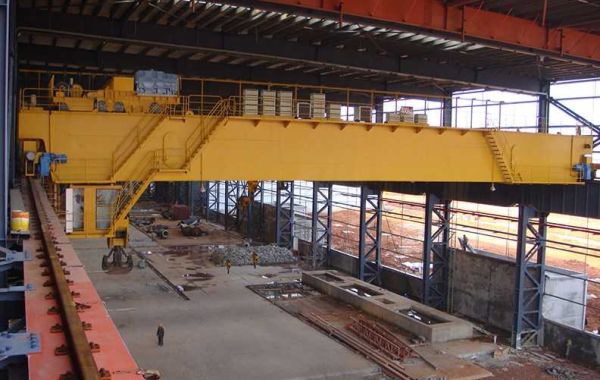Overhead cranes are critical pieces of industrial machinery, designed to lift and transport heavy loads with precision and efficiency. Among the most powerful and versatile types of these cranes are 500-ton overhead cranes, which are capable of handling extremely large and heavy loads in various industries. Due to their immense load capacity and advanced technological features, 500-ton overhead cranes are utilized in some of the most demanding and high-stakes environments.
In this article, we will explore the common applications of 500-ton overhead cranes across different industries, highlighting their critical role in enhancing productivity, safety, and operational efficiency.
1. Heavy Equipment Manufacturing
One of the primary applications of 500-ton overhead cranes is in heavy equipment manufacturing. Industries that produce large machinery, such as mining equipment, construction machinery, and industrial presses, often require the use of massive cranes to lift and assemble components that weigh several hundred tons.
In this context, a 500-ton overhead crane is invaluable for moving large parts like machine housings, engine blocks, or massive steel plates. These components are too heavy for traditional lifting methods, and the crane ensures that they can be moved precisely and safely. The crane's ability to lift, position, and install these components with ease reduces downtime during assembly and ensures that production runs efficiently. The crane also minimizes the need for multiple smaller lifts, reducing the complexity of material handling and enhancing overall productivity.
2. Steel Mills and Foundries
Steel mills and foundries are among the most challenging environments where 500-ton overhead cranes are frequently used. These facilities handle heavy and molten materials, making the need for powerful, reliable cranes critical.
500-ton overhead cranes are used to lift and transport massive ladles of molten metal from furnaces to casting areas. These ladles, filled with molten steel, can weigh hundreds of tons, and transporting them safely and efficiently is essential to maintaining smooth operations in the mill. The crane's precise control ensures that the ladles can be moved without spilling, reducing safety risks and minimizing waste.
In foundries, 500-ton overhead cranes are also utilized for handling large molds, transporting castings, and moving finished steel products to storage or shipping areas. Given the high temperatures and demanding conditions, these cranes are often equipped with advanced cooling systems and heat-resistant components to ensure their durability and performance in extreme environments.
3. Power Plants
Another significant application of 500-ton overhead cranes is in power plants, particularly in facilities that generate electricity from fossil fuels, nuclear energy, or renewable sources like hydroelectric power. In these plants, cranes are required to move heavy machinery and components that are essential for power generation.
For example, in nuclear power plants, 500-ton overhead cranes are used to lift and transport heavy reactor components, turbines, and other critical equipment. The precision of these cranes ensures that these highly sensitive and costly components are moved safely without damaging them. Additionally, the crane's strength and reliability are crucial during the construction and maintenance phases of power plants, where heavy lifting is a routine task.
In hydroelectric power plants, 500-ton cranes are often employed to install or maintain turbines, generators, and large gate valves. These components are essential for controlling water flow and generating electricity, and any mishandling during installation or maintenance could lead to costly downtime or damage.
4. Shipbuilding and Marine Industry
The shipbuilding and marine industry is another sector where 500-ton overhead cranes play a pivotal role. Shipyards require powerful cranes to handle the heavy lifting required during the construction, repair, and maintenance of large vessels such as cargo ships, tankers, and naval ships.
During ship construction, these cranes are used to lift and position large ship sections, including hulls, engines, and other structural components. The ability to precisely control and position these sections is critical, as even the slightest misalignment can affect the integrity of the ship's structure. Additionally, 500-ton cranes are used to install heavy machinery and equipment inside the ships, such as engines, turbines, and cargo handling systems.
In marine repair facilities, 500-ton overhead cranes are used to lift and transport ships or large sections of vessels for inspection and maintenance. These cranes allow shipyards to handle large vessels efficiently, reducing turnaround times and ensuring that ships can return to service quickly.
5. Precast Concrete Production
In the precast concrete industry, 500-ton overhead cranes are indispensable for handling heavy concrete beams, slabs, and other prefabricated structures. Precast concrete components are used in large construction projects, such as bridges, highways, and commercial buildings. These components can weigh hundreds of tons, requiring powerful cranes for lifting and transportation.
The use of a 500-ton crane ensures that heavy concrete elements can be moved efficiently within the factory and loaded onto transport vehicles for delivery to construction sites. By using overhead cranes, precast concrete plants can enhance production efficiency, minimize material handling time, and improve worker safety by eliminating the need for manual lifting.
Additionally, 500-ton cranes are often used during the construction phase of large infrastructure projects, where precast concrete sections must be lifted and positioned with extreme precision. The crane's ability to handle large loads ensures that even the heaviest components can be installed safely and securely.
6. Mining Operations
In mining operations, particularly in large-scale open-pit and underground mines, 500-ton overhead cranes are essential for handling heavy equipment and machinery. Mining equipment, such as excavators, draglines, and conveyor systems, often require regular maintenance and repair, and these massive machines can weigh several hundred tons.
500-ton overhead cranes are used to lift and move mining equipment for repair and servicing, ensuring that machinery can be quickly restored to operation without causing significant downtime. Additionally, these cranes are used to handle heavy materials, such as ore and coal, during the extraction process, enabling efficient material movement within the mine.
The harsh conditions of mining, including dust, dirt, and extreme temperatures, require cranes to be built with durable materials and specialized components that can withstand the rigors of the mining environment.
7. Aerospace Industry
The aerospace industry demands precision and power when handling large and delicate aircraft components. 500-ton overhead cranes are commonly used in aerospace manufacturing facilities to lift and assemble large aircraft parts, such as fuselages, wings, and engines.
In this industry, the precise control offered by 500-ton cranes is critical for ensuring that these components are handled without damage. These cranes also facilitate the assembly of aircraft by allowing engineers and technicians to position heavy components with extreme accuracy.
In addition to manufacturing, 500-ton cranes are used in maintenance, repair, and overhaul (MRO) facilities for aircraft. The cranes lift and move large sections of planes for inspection and repair, helping to streamline maintenance processes and reduce aircraft downtime.
Conclusion
The applications of 500-ton overhead cranes are vast and diverse, ranging from heavy equipment manufacturing and steel production to shipbuilding and aerospace. These powerful cranes play a crucial role in enhancing efficiency, safety, and precision in industries that rely on the lifting and transportation of heavy loads.
By investing in a 500-ton overhead crane, industries can achieve greater productivity, reduce material handling times, and ensure the safe movement of massive components. Whether it's in a power plant, a shipyard, or a steel mill, the versatility and strength of a 500-ton overhead crane make it an indispensable asset in today’s industrial landscape.







